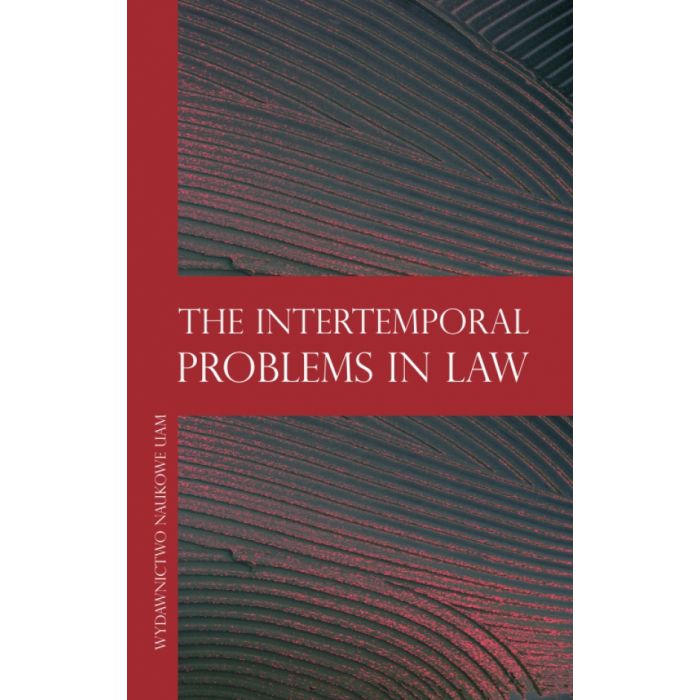The intertemporal problems in law
Fascynacja czasem jest naturalną konsekwencją faktu, iż kategoria czasu należy do uniwersalnych pojęć, przez które poszczególni ludzie czy społeczeństwo postrzegają rzeczywistość. Czas towarzyszy każdemu elementowi życia indywidualnego i zbiorowego. Tym samym we wszystkich obszarach powstaje pytanie o stosunek do czasu. Sposoby pojmowania czasu, a przede wszystkim orientacji temporalnych rozumianych jako postawy wobec obszarów czasu, są coraz częściej przedmiotem zainteresowania także nauk prawnych. Regulacje intertemporalne rozumiane współcześnie jako spozytywizowane rozstrzygnięcia intertemporalne są immanentnie związane nie z czasem naturalnym a czasem sztucznym. Tworzony przez społeczeństwo system prawny buduje odmienne ramy czasu prawnego, którego częścią istotną są współcześnie zarówno regulacje intertemporalne w formie określonego zbioru przepisów stanowiącego decyzję prawodawcy, jak i same rozstrzygnięcia intertemporalne, czyli każde prawne rozstrzygnięcie problemu intertemporalnego przyjmowane na gruncie kultury prawnej określonego społeczeństwa. Choć kategoria czasu jest tylko jednym z elementów problematyki intertemporalnej w prawie, to w ujęciu historycznym stanowiła punkt wyjścia w ogóle dla refleksji w tym zakresie. Dziś stanowi ona przede wszystkim obszar zainteresowania rozumiany jako pole prawnych rozstrzygnięć zagadnień związanych ze zmianą prawa w stosunku do sytuacji prawnych z elementem dawnym. Nie tylko złożoność wykładni prawa, ale przede wszystkim złożoność struktury tekstu prawnego, odnośnie którego w procesie stanowienia prawa nie zachodzi proste zastępowanie jednego fragmentu tekstu aktu prawnego drugim, stanowi o specyfice problematyki intertemporalnej prawa. Problematyka intertemporalna jest współcześnie nieodzownym elementem stosowania prawa, albowiem stawianie i rozwiązywanie problemów intertemporalnych tak naprawdę towarzyszy pracy wszystkich zawodów prawniczych.
Fascination with time is a natural consequence of the fact that the time category is a universal concept by which individuals or societies perceive reality. Time accompanies every aspect of individual and collective life. Thus, in all these diverse areas the question arises on the approach to time. Different ways of understanding time and, above all, temporal orientations construed as attitudes towards time zones, are increasingly of interest also to legal sciences. Intertemporal regulations, understood today as statutory intertemporal solutions, are intrinsically linked not to natural time but to artificial time. The legal system created by these societies builds upon a different temporal framework, both in the way of a defined set of statutory provisions that stem from the legislator's decision and the intertemporal solutions themselves, i.e. any legal solution of an intertemporal problem adopted as part of a legal culture of a particular society. Although the category of time is only one element of intertemporal law, the historical perspective was in general a starting point for the reflection on this subject. Today, it is primarily an area of interest construed as a field of legal solutions pertaining to changes in law in relation to legal situations with an old element. It is not only the complexity of legal interpretation but, above all, the complexity of the structure of legal texts which is specific to intertemporal law and which, as far as statutory enactment is concerned, cannot be reduced to replacing parts of a legal text by another. Intertemporal issues are today an indispensable part of the law application, since posing and solving intertemporal problems is in fact an integral part of the work in all legal professions.
| Detailed information | |
|---|---|
| Contents |
Download file

|
|
|
|
| Publication Version | printed |
| Format | 17,0 x 24,0 |
| Title (EN) | The intertemporal problems in law |
| Type of publication | Monografia |
| Edition | I |
| ISBN | 978-83-232-3195-0 |
| Number of pages | 246 |
| Number of publishing sheets | 18,00 |
| Type of binding | paperback |
